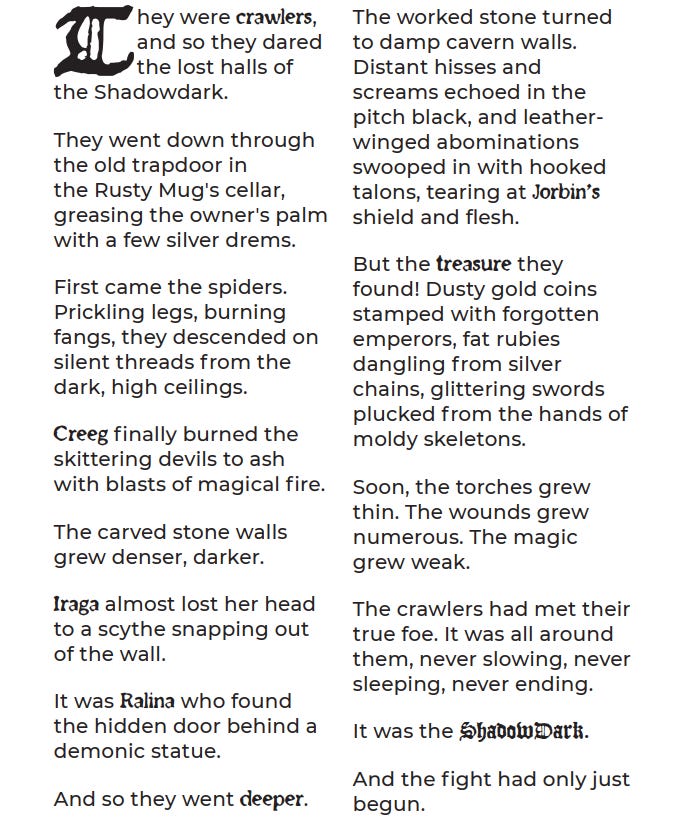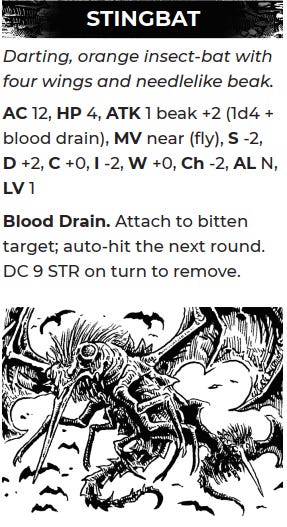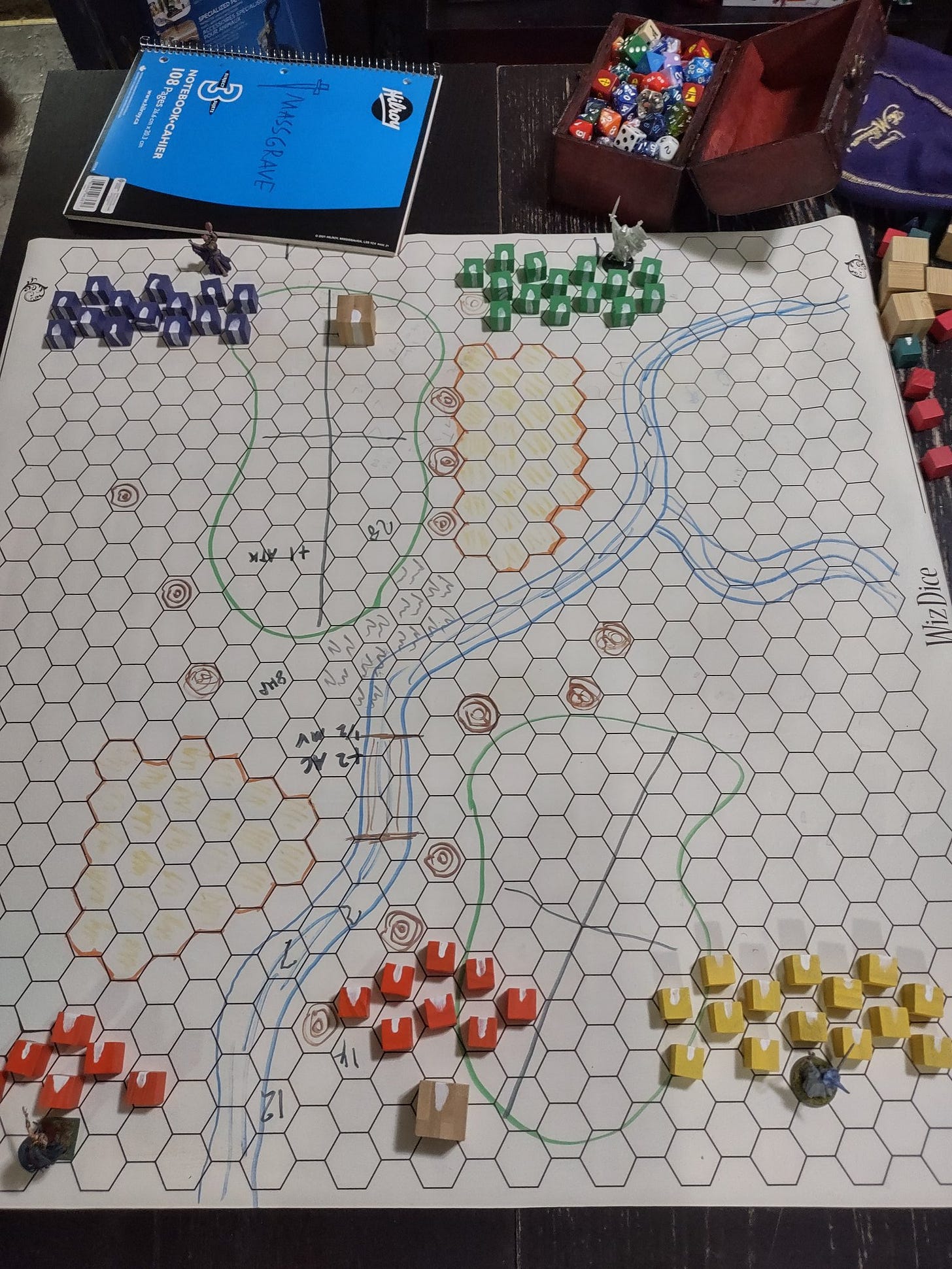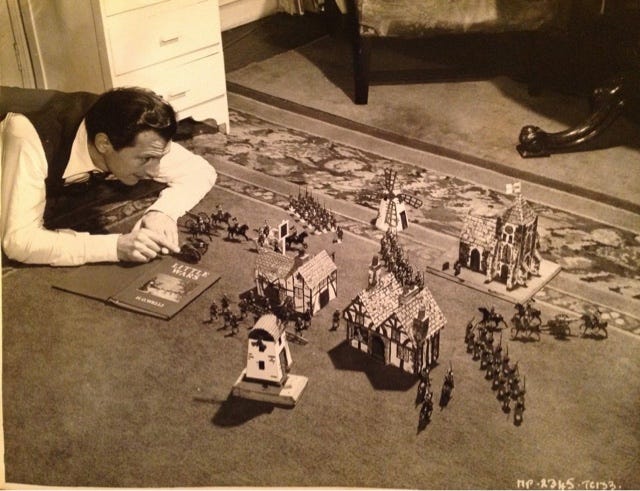Yes, clickbait. Yes, melodrama. Warring factions of tabletop gamers, the true and current keepers of the D&D throne, rejoice. The saviour walks among us, and in the darkness of its penetrating shadow, it lays all other OSR games before its feet. The end times are here - the OSR is dead.
Long live the OSR.
I mean, this is roughly the tone of the online discourse on X that takes place on an secondly basis; an endless stream of bickering, a parade of clowns cartwheeling off a cliff and into an open caldera. The internet is a dump, social media is a curse, and we would all be better off hitting sticks on trees to entertain ourselves - at least the pasty skinned among us wouldn’t be suffering a vitamin D deficiency.
It’s exhausting sometimes because the negativity is palpable. People are willing to say whatever is on their mind no matter how crude and idiotic it makes them look (I’m exhibit A) because there is no imminent threat of having an ax embedded in their skull. And I learned really quickly that you need to learn to suss out useful criticism and discussion from the manchildren who shit their pants on the floor and throw themselves out the window the second you question any part of the constant noise they spew out.
Nevertheless, exhausting. And when I first joined, I came at a time when, probably the one-hundred seventeenth time it has happened, people were bitching about things when I arrived. And what they were bitching about was a game called Shadowdark.
The Shadowdarkening
I admit, I knew basically nothing about this game. The last few years my interest in D&D has been narrowed down to a few key books, and about 70 percent of those is concerned exclusively with AD&D. It was probably at the end of some mushroom trip that I groggily picked it up for a full read through again and all the while repeating, “why did I ever put this down for anything else?” Buying game books was becoming tiring and redundant. I don’t really buy adventures all that awesome except to see what ideas people have from time to time, so the majority of RPG stuff I collect are core books for various systems.
But it was enough. I looked at my stack of books: Swords and Wizardry, Labyrinth Lord, White Box, Basic Fantasy, Old School Essentials…a good, oh, maybe 4 and a half pounds worth of paper and cardboard sitting on a dusty shelf going unused because why use those when I can just use B/X? Or whatever?
I started to purge a lot of these games, giving some away, selling others. Redundancy is redundancy no matter how many times you try to repackage it.
So when I heard all this Shadowdark shit and briefly looked it up, I couldn’t have been less interested. “Another fuckin’ B/X game.” I muttered, mustering all of my grognardian bitterness towards anything new.
After a week though, people did what they do best and ceased to shut the fuck up for five seconds on the internet, except it was about Shadowdark. More videos started coming out. I started to look at the system more seriously because I couldn’t understand either side: the people mad about Shadowdark, and the people praising it as the Second Coming.
So I did what any struggling self-appointed RPG analyst, emphasis on anal, would do - I reached out to Kelsey Dionne about getting a PDF for review.
Since, I have played many many sessions of it. I became enamored of it very quickly. It’s a perfect game for dungeon crawling.
It is also good (perhaps not great, I’ll get to that) at acting as a gateway game. Everyone has a gateway game into the hobby, whether that’s RPGs or other tabletop games. The proverbial Catan that moves people away from playing Risk to that rabbit hole where they might end up at Advanced Squad Leader. For our hobby, it’s no secret what the common gateway game is. And it’s a gateway with such a grasp on the market it belongs too that a good percentage of players who do stick with it may go their entire lives without playing any other TTRPG.
This is the undisputed standard. Pathfinder, a close second in the west, or at least it was, and overseas, Call of Cthulhu. And people that enter the hobby under the 5e banner are immediately predisposed to stick with it because it is not just a game anymore, it is now an ecosystem. It’s an online platform where you invest in digital books to access more database features for your digital character sheets. It is a VTT with microtransactions in the very near future, and it has the single largest player base of available people to meet and have awful D&D games with.
It’s a Venus flytrap. It’s a Chinese fingertrap. It’s some other kind of trap I can’t think of, and it’s the bane of a deeper understanding of the roots of roleplaying, and potential experiences that can be mined going down through the history of D&D that are being eschewed in favor of the narrative and “story” that 5e so heavily enforces in its design.
When you make a character in D&D, you need to define many aspects of that character beyond base stats and skills. You need to know who they are. You need to assign them one of many races and classes to play as out of a vast multitude of options. If you do not have a computer, have fun sweating over your first character sheet for the next two hours trying to make sense of it all.
That is an investment, and a commitment. And the general expectation that DMs have of players is a bar that has been steadily lowered over the years.
Perhaps in a partially cynical and greedy way, old RPGs would encourage each player to have access to a Player’s Handbook. That was their manual, and their lifeline. They were generally expected to read and become familiar with it before true sessions began so that they could reduce the number of questions they were asking in an effort to keep the game flowing smoothly.
Now, DMs who run games in castles and make a living of off YouTube videos for their efforts aren’t even bothering with the Dungeon Master’s Guide. And players? Forget making them read. In a landscape where literacy is dropping like a test missile in North Korean waters, good fucking luck - can I watch the rules on TikTok somehow, when’s Neuralink gonna be available? That book is 300 hundred pages more than what I have read in the past twenty years, Jesus Christ!
So forbid, God forbid that your players be expected to know anything about the game, but who have instead written a seventeen page back story about how their character is actually a prince who can turn into a frog, travel through time, and used a sports almanac to become a billionaire in the future. This is clearly where people’s effort should be going, and obviously enriches the entire experience for everyone.
And when they are sitting on a manuscript of a biography of their half-cat half-dragon humanoid who can hear thoughts, God forbid that there is any potential of this character succumbing to the difficult to cure disease of having a sword shoved through his head. The man hours wasted! Better just throw that fancy character sheet in the dumpster and cry your bitter tears.
This is the proverbial haunted house entry gate into the hobby, and these are the perpetuated expectations of what a D&D 5e game will look like. DMs writing Tolkien fan-fiction, and players writing down what their characters grocery list would look like.
And look, I’m not going to repeat the sentiment of “but that’s okay, people can play what they want.” I’ve already said I don’t care how people play and enjoy their games. But what I don’t like is that this Matt Mercer-esque play becomes such a demanding burden on the DM to run and encourages railroading to such a degree that it’s essentially a completely different game from really any iteration of pre-5th edition D&D.
Saying anything else would just be treading over known history to anyone who is reading this; the OSR movement, the resurrection of old D&D rules in an open license format, a plethora of backwards compatible existing content to be mined from the past and celebrated, and an entire community dedicated to one particular interest: the prolonged and intense investigation of the history of the greatest game in the world.
Shadowdark is a catalyst into a different style, or styles of play not even known by the majority of 5e players. A style of game truer to the brutal wargaming roots of the hobby. A game with explicit goals and fundamental rewards for achieving those goals - the acquisition of riches, the quest for fortune and glory. A sword and sorcery simulation of the most dangerous magnitude where character creation is a brief and simple affair because the foregone conclusion is that your character will suffer and die before the end.
But to the victors, the fruits of glory. The raging against the RNG machine, the middle finger lifted in the face of impossible odds. Those odd characters that go on to survive are touted as true heroes, immortalized in an eternal world of imagination who have made a visible imprint on the world around them.
Catching Flies with Honey
By virtue of the OSR existing to illuminate people about the “old ways”, the grand strategic form of D&D that still has not achieved popularity with the masses after over 50 years of constant restructuring, the dissolution of ideas espoused by modern D&D players as the “true way” to run a game (until a popular influencer deems it should be otherwise and everyone changes direction to follow them) has already begun.
Shadowdark raised over a million dollars during its Kickstarter campaign. This was all in the midst of WOTC crapping on the floor in different locations around its house of cards for its eager fanbase to slip in. Lightning in a bottle successes are usually a combination of good product, timing and execution, and Shadowdark nailed all three. A game purely about the crawl competing directly with 5e - what a bright and promising thing to see.
But what Shadowdark especially nailed was having the right person behind it.
Kelsey Dionne is no stranger to the RPG scene. She has written 5e material, has been playing D&D since she was young, and clearly has a knack for understanding design and aesthetics. You know what sort of product Shadowdark is the minute you pick it up and start flipping through its pages, but it also carries that same mystique and danger of RPG books of old, when the Satanic Panic was in full swing, and when soccer moms everywhere were pissing their pants over “elf games”.
Kelsey runs a large community on the Shadowdark Discord which is full of players and contributors to the quickly expanding milieu of Shadowdark adjacent content. She regularly attends cons and interfaces with other influencers. She did the entrepreneurially correct thing, which was to make an identity for herself before her product even went into testing.
These facts are very troubling to other creators in the OSR scene. The people who have been doing this shit for years, and as a matter of course, perhaps feel some sense of ownership over, or entitlement to it. And it’s broadly a shame in some sense, because when these people levy any criticism towards Shadowdark, it is immediately interpreted as jealousy. And no doubt, some of it is.
But many of these same people seem to fail to see why Kelsey is particularly charming; she is friendly, down to earth, and private. She is also very very busy. Part of the reason this is coming out so long after I first mentioned it is because I posited some questions that remain unanswered, but in a lot of exploration, I think I have mostly answered them anyways. We also had an interaction on Facebook where she broke down the value of her book, initiated by my complaint of how expensive it is to get a hardcover of Shadowdark into this goddamn country - about a 110 bucks, all said and done - and she wrote a lengthy rebuttal to this, with the final sentiment being that because Shadowdark is a Player’s Handbook, Monster Manual, and Dungeon Master’s Guide all rolled into one, that this would justify the price of it.
I will touch on this a bit later, regarding how we interpret value. In this particular case I was talking about how high production values naturally inflated the price - I have seen and held the Shadowdark book in person, despite failed attempts to find a copy anywhere, including my proverbial “home base” The Sentry Box, a board game store so big that the total square footage is probably comparable to a grocery store. I will tell you right now - if you are enamored of little leatherette pieces of arcane memorabilia, artifacts such as The Book of Nod, or…well, I was going to say Hackmaster, good luck finding that shit anywhere - you will want this book. But if you are outside of the United States, you are gonna pay out the ass for it right now. Though Kelsey has said they are looking at possible Canadian distributors that might be able to make the process of getting it out here cheaper, possibly.
Anyways.
On the Shadowdark Discord there is a no tolerance policy for discussion about politics. On X, it may actually be a silent requirement that no matter what your other interests are, that you constantly engage in political discourse while proudly waving your flag, whether it be the stars and stripes or a rainbow, or just a good old skull and crossbones. It’s become such a regular phenomenon to become some raving pundit on the internet, as though people gave a good damn about anything you have to say.
Kelsey wisely navigates this by doing the ol’ “lets just walk around Mirkwood.” And as a result, there is a bare minimum of toxic arguing and pants pissing that usually occurs in communities which are very passionate about a specific topic, but where that particular topic says nothing about their worldview. You are forced to go in and behave, regardless of your zaelotry or patriotism. There is no smoke, there is no fire.
This has led ax-grinders online to purposely try and “dig up dirt” on Kelsey, to prove she must be a “woke lib” or whatever other pigeonholing lazy identity label people like to slap on others because they have forgotten how to interact with humans. People want their conflict so much that they are willing to pick up a shovel and pick away at the frozen earth for the mere possibility that they might dig up a turd they can sling in someone elses direction.
The irony is that these people are out to do this because they have something motivating them. And in this case I can’t imagine it being anything other than profit or jealousy, or sometimes, the vaguely passive-aggressive tendency to try and assert ones intelligence over others the moment they feel they are being creatively threatened in some way.
Who knows, people are nuts.
Kelsey of course always comes out on top, because she sticks to her guns on remaining impersonal with these people, which is the only reasonable thing to do if you are selling a product and not relying on a cult of personality to uphold that. Shadowdark reaches much further than the built in Kelsey fanbase, and is introducing a whole generation of gamers to the oft meandering and saturated OSR scene. There are more published OSR compatible adventures than there are stars in the sky. But they need people to discover and play them. And you catch more flies with honey than you do with vinegar.
The truth is, I’ve interacted with a lot of “controversial” people in the RPG scene. And the most maligned ones all have the same thing in common; they are so deliberate and stubborn in their opinions that they make friendly discourse almost impossible to anyone who is not operating on their intellectual level. This is alienating. This is the proverbial “gatekeeping” everyone races to avoid. But again, some of this boils down to loyalty to the core product. Guys who have been doing this shit for thirty years, have seen it evolve and shit the bed over and over have that sense of ownership. It was ours, we were here in the beginning, and if you are part of the nu-D&D scene in any way, you are just a tourist.
I am not offering any particular opinions on this way of thinking. I myself have very strong opinions about the potential of D&D when we look into the history of the hobby. I generally have an “old” way of thinking about D&D. So it would be hypocritical to point to those tendencies and say they are “wrong”. But what I will say is that in an already relatively small market, you aren’t doing yourself any favors from a marketing standpoint by being a miserable prick to anyone who disagrees with or challenges your assertions, or perhaps just has a different opinion that you can’t abide.
You may be a good DM, but if you do that, you’re a shitty business man.
But here comes this product, a competently put together system of familiar rules and some extra flourishes, made by someone who clearly loves RPG’s and is actually pleasant to deal with and not a grumpy piece of shit like your humble author, in a time when people are increasingly disenchanted with WOTC nonsense, with a growing and stable community of friendly people that captures the spirit of gritty D&D while still being approachable, easy to learn, and familiar to converts from 5e?
Lightning in a bottle.
The funniest part about the non-troversey of whether or not Shadowdark “deserves” its accolades is that the people yelling about it are doing so from a soundproof sensory deprivation tank packed full of other cranky grognards who are making fifteen cents in royalties per month. It’s false news travelling fast right into an open grave, because nobody but their own sub-community really gives a shit, and just wants to play good games.
So, we are past that stupid goblin in the room. Where does that leave Shadowdark, then? This is a bit harder to answer, because while it is effectively acting as a transitional beacon between 5e and 1e etc, it’s very difficult to gauge it from the perspective a player that is completely new to the hobby.
Into the Shadows
You have a book presented with all the flourishes expected from a slick RPG core set that clearly and concisely conveys the information that it needs too while leaving specifics open for DM interpretation. At the same time, while there is time spent explaining what an RPG is and how to run one, there are simple things that feel incomplete from the perspective of someone who has never played an RPG before.
There are portions of the text that feel like so much fat was cut off that some meat went with it in the process. These are generally minor, but when I was reading the book I was trying to put myself in the headspace of someone who had never played an RPG before. If Shadowdark lacks, its in expressing its context. Because everything has to be condensed so much to fit the parameters of an approachable game that moves away from the maximalism of more popular current RPGs. This is where it’s hard to judge if Shadowdark is trying to bring in a new audience, or simply convert an existing one like Martin Luther. Except in this case where Lutheranism is just Catholocism with extra steps, Shadowdark is more like those Orthodox Russian guys who look like a biker gang, without the fascist and racist implications therein.
It could be aimed at seasoned OSR players, but one of the issues it has here is that it isn’t different enough to necessarily justify itself to an OSR base who is already comfortable with the more fiddly bits of other OSR games, some of which offer quite a bit more depth regarding the running of longer campaigns with domain elements.
But Shadowdark knows this, and scoffs at it. This is a game for the delve. It’s a goddamn celebration of grit, and the spirit of the crawl. It embodies this in every way imaginable. Just look at this intro, look at it.
It’s just…it’s beautiful.
After my read through of it, I immediately started on my own adventure module. The classic “one settlement, one multi-layered dungeon” standard that works so well for West Marches style drop-in games.
This is where I really got a sense of Shadowdark and how it plays, and I can’t deny it’s a fairly immaculate little machine of moving parts. It’s B/X par excellence. It’s an appealing, nasty little goblin of a deadly game in the right package, released at the right time, and although it doesn’t innovate in an entirely significant way, it pegs itself as the quintessential OSR experience - the final culmination of what could possibly be mined and reorganizeed in that system. The perfect gateway to a more arcane style of gaming.
Needless to say it has been perfect for my little Wizardry inspired Westmarches campaign. And this makes me kind of sad.
Because it is the end of the OSR. It’s the end of it for me. It’s the last time I will ever buy “yet another B/X” system. And it has replaced all the rest of them in my mind as “quintessential.” But it is the last leg of my personal journey in that space as a consumer and player of those games. (After ACKS2, then I’m done, I can quit anytime you know)
In the beginning this started as a blog about “deep dungeon mastery” a term I coined at that time out of honest ignorance. I wasn’t really aware of the online space of creators and collaborators. I wasn’t aware of the old guard, and what they were doing to expand on the original inspirations and principles D&D grew out of. I grew tired of filling in gaps, and I grew tired of one dimensional campaigns that always fizzled out because domain play had been completely stripped out of the game in favor of an abstracted combat game with no purpose beyond the next dungeon, the next crypt.
My disenchantment led me backwards it time, to AD&D. And that is where I have primarily stayed for the last several years.
Shadowdark is the first OSR system I have run in a long while and with any enthusiasm. It’s the last interesting product since Mork Borg for me. Mork Borg was something I bounced off of far more quickly than I had anticipated. Shadowdark has already outlived it. I really like the community that has been built around the game, and it just has the right feel for the type of dungeon delves I like to create.
But it really makes you wonder where things can possibly go from here. My personal feelings about the state of the fantasy RPG in 2024 are very mixed. The old school renaissance has been a heartening and interesting time as an older D&D player. It has created a whole new player base for old school games.
But here’s the shitty thing about it. The shitty thing about OSR is that it ever had to happen at all.
The shitty thing about OSR is that it only exists because the caretakers of D&D screwed everything up after AD&D and essentially just started making their own games which were D&D in namesake alone.
OSR is a symptom of mistakes. It is a necessary return to the roots of the tabletop RPG. It’s an exploration and rumination on systems primarily, and how those symptoms inform a gameplay style which is less homogeneous, more specific in tone, and far more spartan in the complexities of its rulesets.
You can’t dwell in the past, but it does make you wonder where RPGs would be today if the more large scale gameplay ideas from D&D had been kept and expanded upon. If the system continued to evolve rather than outright being replaced with something else, time and time again. But this is not the game for that evolution, at least not as a core product. And that sort of expanded play will be an ongoing discussion on this blog for the forseeable future, since I don’t plan to do a piece like this on a new product unless it is ACKS2.
Finally, we reach the end of this…whatever, where we have to answer the question. Is Shadowdark worth it?
Aesthetic and Tone
Even in a scene that is meant to exemplify the old, new ideas must materialize in order for the community to grow or be sustained.
Shadowdark is a perfect package of old ideas. But it is one that is informed by a modern way of thinking about D&D - very specifically, the focus on the adventure, on the crawl, on the roleplay. It has stripped out every ounce of fat to be as straightforward and functional as possible. If Shadowdark has any kind of a “problem”, it’s that it does something similar to many other contemporaries in the space - it omits detail.
You have a hex crawl generator very much extracted from AD&D, but its description is so terse that it doesn’t even really explain what a hex crawl is to someone new to RPGs. There is no domain play, which as I already pointed out - of course there isn’t, that isn’t what Shadowdark is trying to do, but very much like other similar games, Shadowdark constrains itself to a very particular aspect of the traditional conception of RPG’s, which are the dungeons and dragons you will be exploring and slaying - in that order.
But I want to be very fair here, because I think this is important: we must recognize that a part of the success of an OSR game in comparison to a mainstream RPG juggernaut such as D&D is the continued backing and support of the community who play it. These are not really problems as much as they are avenues of opportunity for other creators to build and release supplemental materials to fill these gaps.
And sometimes minimalism is good.
Let’s take a look at a monster stat block:
That’s it.
One single sentence about the creature. Stats formatted as tightly as possible while still being human readable. No picture, no nothing. Repeat for a few dozen pages.
Now, there are examples in the book of full monster treatments. But this general format is smart. It allows the page to be as dense as possible with information. A DM can open the book on the fly and in about five seconds understand if the monster is appropriate for their situation.
As a DM who essentially does zero prep as far as adventures/plot are concerned (all of my prep is done in worldbuilding) this is such a Godsend I can’t even tell you. No distractions, no bullshit. It’s a fucking skeleton, you know what a skeleton is, here’s it’s AC, HP, and number of attacks on one single line.
I’ve heard people criticize this part of the book in particular. Specifically the descriptions of the monsters, calling them repetitious.
You know what? I agree. My ideal monster book wouldn’t even tell me anything about the monster. I’ll look at its stats and figure out what it is. Why? Because I don’t want players telling me “Oh that’s an Orc, it only has 6 HP”. No it isn’t asshole, its a G’ork actually, just keep your mouth shut.
There is just enough here to both appeal to the sensibilities of seasoned DMs who just want quick access to information, and to a crowd completely new to any kind of fantasy gaming. It’s not particularly evocative language that is used in the descriptions because the real estate is extremely limited. I think that it could have been improved somewhat by perhaps changing who is writing the description - make it come out of the mouth of a character in the world, have them be describing what they see. Or…something. But really, who cares.
Oh, and have I mentioned that the art by (I went to fill in this part and I’m either terrible at Google or the artist who did this piece is intentionally left ambiguous? Anyways.) is the most perfect, tone setting book cover to come out in some time?
Damn.
You know that things are going to be deadly the second you see that cover. It isn’t…this:
I don’t know what this image says to me about what I am about to play. A Midsummers Night Dream RPG after two tabs of ecstasy? Bring it on actually, nevermind.
You take one look at the Shadowdark cover and you immediately understand what kind of game this is going to be. “Shadowdark”. In any other product, an almost completely generic name. But in Shadowdark, it means everything. We aren’t gonna be hanging out in Waterdeep busking for electrum here, on no. It’s into the fucking pit with you bloodthirsty sons of whores.
And the rest of the game of course suitably follows this pattern.
”But it’s STILL just a B/X game”.
While we are talking about aesthetics, lets look at the covers of other games in the OSR vein.
Basic Fantasy.
Basic. Fantasy.
Doesn’t exactly arouse the imagination does it? And then 4th ed in the corner…who is Ed, and what the hell happened to the other three of ‘em?
Basic Fantasy is a great game, and one that is free, with physical copies being sold at cost. It’s a fantastic game for new players because you can buy a copy for each player at like half the price of a D&D Player’s Handbook. Or a copy of Shadowdark, for that matter.
But again, it’s…well, basic. It ain’t setting the world on fire visually and the name sounds like the title of an instructional VHS tape.
And this is where I come back, full circle, to value.
I could make an argument, and have, that Shadowdark isn’t a whole lot different than games like Basic Fantasy. But Basic Fantasy doesn’t have stingbats.
So that stupid argument is invalid.
It also has, as discussed, a masterfully crafted hardcover book with incredible art. It has flavor and identity.
You and I my friends - we transcend these feeble human emotional drives to need things that are pretty. Most of us probably use lined paper for character sheets, and I use wooden blocks instead of miniatures.
But people want nice things. They want things that have character. They want things that are not so broadly open as to be unfocused.
A game that is worth 100 dollars is more appealing naturally than one that is worth 50. There is a perception that more is better. And Shadowdark is not just more, it is most. Of course it is not alone in being three RPG books wrapped into one, if I had to get contentious about Kelsey’s point - White Box is a slim volume that also operates in the same manner and costs 5 bucks. Same with Basic Fantasy. But it is complete, far more complete and more inexpensive than many RPG’s that require you to spend 150 on books, that is certain.
And it is not just complete as a game, but it is visually attractive, has a solid community, is made of very high quality materials, has fantastic art, and yada yada yada.
So let’s answer the question right now: is Shadowdark worth 110 of your hard-earned Canadian dollars?
Years ago when AD&D was getting reprinted by WOTC, I dove in and grabbed the Dungeon Master’s Guide, maybe a year or three out, and paid 90 dollars for it new and sealed on Ebay.
That book is a treasure to me. It is the single best RPG book I have read to this day. And it is the source of my absolute favorite game, of any kind, in existence. I reference it almost constantly, and it was definitely made well because mine still looks damn near the way it did when I pulled it out of it’s original packaging. For the amount of time I have read and referenced that book, I don’t think I could put a price on it really. It has been absolutely quintessential to me and my continuing journey as a Dungeon Master.
Shadowdark has potential to provide limitless hours of entertainment. With nothing required but itself. And there is an ever expanding milieu of extra material made for it, both by Kelsey, and by many other contitributors to the space. It has at this point tremendous potential to stay relevant indefinitely, because it is the current Queen of the OSR, and it’s really hard to imagine anything being able to come out that would have quite the same impact.
So where the heck do we go from here?
The Future of OSR
So Shadowdark is the result of a long journey - it occupies a comfortable space where we meld new ideas with old, and refine them until they are as indefatigable as diamond. So great. And what of it?
This is where talking about Shadowdark as a product ends, and a new discussion begins. But it’s not a discussion that can take place effectively in a blog, or on an X or Discord thinktank. It’s a discussion that is going to go on, perhaps for years, and will be done through the production and release of whatever the next “generation” of OSR games is going to look like. Because at this point, the horse has been beaten. Pulverized. Dessicated. It was the culmination, but it wasn’t alone. It comes out of years of projects with similar aim. And it proves that there is plenty of life left in a hobby that everyone and their grandma insists is “dying”.
Things don’t really die. They change form maybe, they shift direction, but something remains there in the process even if we cannot see it. D&D was a wargame, and though the perception of what D&D is remains largely contradictory to what the public perception of D&D is, those roots remain.
I can only make predictions on what sorts of games we might see going forward. But I will say this much - the OSR as it is called has essentially served its purpose. We now have countless games out there dedicated to honoring or preserving beloved classic implementations of Dungeons & Dragons. OSRIC was probably the most essential first step here, in that it initially existed not as a game at all, but as a reference book specifically developed with the interest of allowing people to publish AD&D products without violating any of WOTC’s copyrights. We have gone from a deeply impersonal text not even intended to be used as a game per se, to an ecosystem of such games that are continuously reinventing the wheel while adding the individual touches and creative ideas of the ones who are, in a sense, publishing an elaborate set of house rules.
Further to that, we are going to see a continual fragmentation in the broader community - because something as vague and huge as the TTRPG and Wargaming space do not do a wonderful job of acting as homogenous blanket community - it is specific games that develop this and keep it going. Not only are we seeing a lot of interesting RPG products within and outside of the OSR, but we are also seeing a lot of history being dug up from the Blackmoor days which are resulting in novel styles of play - the Braunstein being one of the more prominent and interesting.
As well as that, there is a developing appreciation from some younger folks about the roots of these games, and all sorts of new discoveries and experimentation being done in the name of that lineage. We are looking into the past to find the future, and while it may now be an agonizing process for anyone trying to be the next Shadowdark since Kelsey has nailed it so precisely, that is not the only door open to us. The well is near limitless as long as we keep playing and studying these games.
It hearkens back to TSR for me - Tactical Studies Rules. What an odd name for a “game” company. It is really more evocative of some sort of research collective or organization than it is a company that produces games about dragons and wizards.
The fact is, any further contemplation is futile. D&D has been an experiment. A grand experiment that happened more than half a century ago. One where a lot of the people involved in its initiation have since passed, and one where the torch is continuously being passed down to see just what can be mined out of this style of game. It’s one that is potentially endless, because we don’t know what the ceiling of possibilities is. And everytime some asshole like me comes along and says “Shadowdark though, that’s gonna be the PINNACLE of B/X games.” they are dead wrong, and something else comes out of the woodwork and surprises everyone all over again.
I may be a stubborn crusty old bastard who is dead-set on AD&D being the alpha-omega of RPGs but some of that comes out of sheer disenchantment with the fact that the games I have been buying for the last fifteen years have basically all been an iteration of the same game, regardless of if they actually iterated upon anything at all. It’s just testament to how well it was executed the first couple of times. Even OD&D is still a very playable system. And that is a notable acheievement which proves that complete reinvention just might not really be necessary.
Shadowdark therefore is also “unnecessary” in the same way that the Ferrari Huracan is unnecessary. It’s just another car, one with four wheels and an engine. But when you put it beside a Volvo, it doesn’t take an exceptionally vain person to see why you would want to leave the dealership in the Ferrari.
It’s just fun to ride, baby.
You can buy Shadowdark at Arcane Library. Big thanks to Kelsey for providing me with a copy of the book. I regret reading it because now it eats up two days of my week with games that I could be spending taking mushrooms in a bathtub while listening to the Queen discography. But you can’t win ‘em all.
















Very much enjoyed the article, big fan of Shadowdark myself and I admire the ability to trim down your collection, I've not yet mustered up the fortitude to do that with my own 😅
I thought your article was interesting...until you threw in the sh*t and f*** words. You just stop sounding intelligent when using those words.